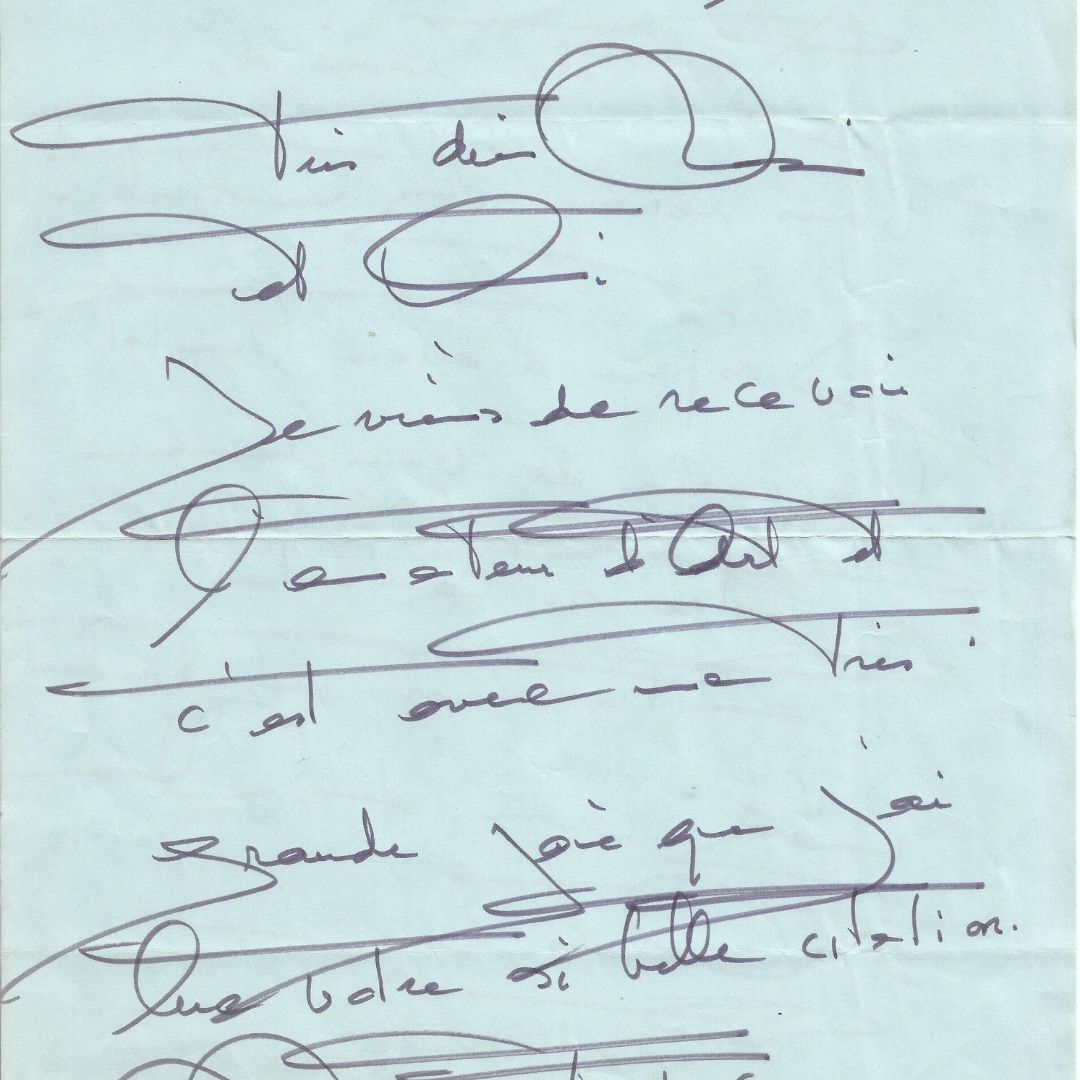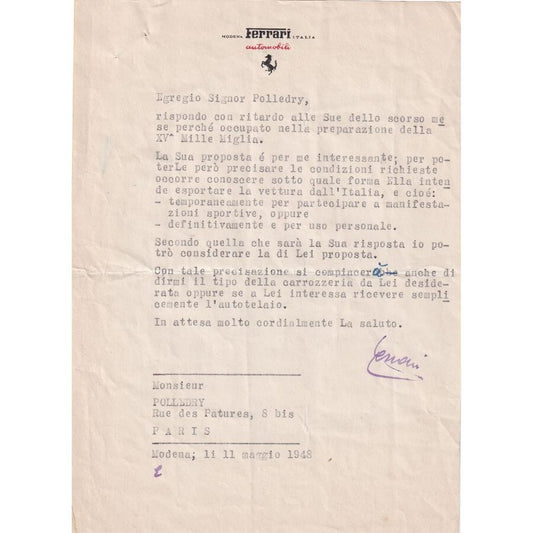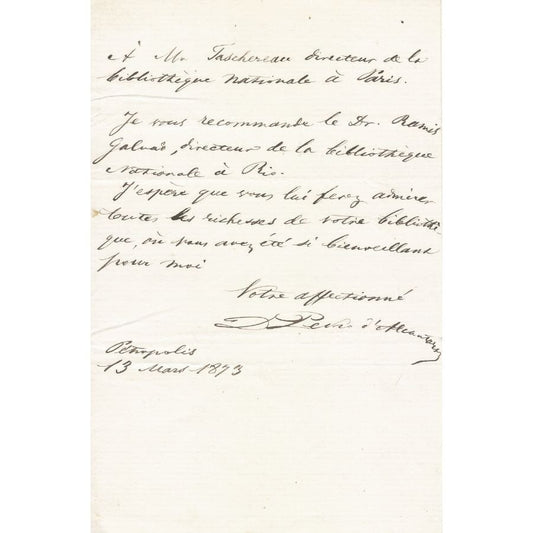
Principais temáticas
Ver tudoParcelamento em até 5x sem juros ou 5% de desconto para pagamento à vista.
Últimas descobertas
-
Manuscrito de Edmond Becquerel (1880s)
Preço normal R$ 6.500,00 BRLPreço normalPreço unitário / por5x de R$ 1.300,00 sem juros
-
Esquema original da internet feito por Vinton Cerf (1977)
Preço normal R$ 4.000,00 BRLPreço normalPreço unitário / por5x de R$ 800,00 sem juros
-
Carta manuscrita da Leopoldina (1860)
Preço normal R$ 4.000,00 BRLPreço normalPreço unitário / por5x de R$ 800,00 sem juros
-
Carta manuscrita da Princesa Isabel (1852-1856)
Preço normal R$ 5.500,00 BRLPreço normalPreço unitário / por5x de R$ 1.100,00 sem juros
A nossa prioridade, a autenticidade dos documentos
100% dos documentos raros do Glórias foram analisados e autenticados pelos melhores especialistas brasileiros e internacionais | Oferecemos uma garantia sem condição e sem prazo para todos dos documentos adquiridos por nossos clientes | Todo documento vendido no site acompanha seu Certificado de Autenticidade e Garantia Digital, devidamente assinado e carimbado.
Destaques
-
Cartaz publicitário da Pepsi autografado por Pelé (anos 1970)
Preço normal R$ 7.500,00 BRLPreço normalPreço unitário / por5x de R$ 1.500,00 sem juros
-
Storyboard do filme Rain Man (1987)
Preço normal R$ 9.000,00 BRLPreço normalPreço unitário / por5x de R$ 1.800,00 sem juros
-
Carta manuscrita de Joaquim Nabuco (1906)
Preço normal R$ 12.000,00 BRLPreço normalPreço unitário / por5x de R$ 2.400,00 sem juros
-
Carta manuscrita de Vinicius de Moraes (1954)
Preço normal R$ 20.000,00 BRLPreço normalPreço unitário / por5x de R$ 4.000,00 sem juros
Clientes 100% satisfeitos desde 2010
Alexandre G, de São Paulo | Novo cliente que encomendou uma carta de Vinícius de Moraes | "Recebido, muito obrigado. Fiquei impressionado com o profissionalismo e qualidade no atendimento."
Todo o catálogo, todas as personalidades
-
Duas cartas assinadas por Enzo Ferrari (1948)
Preço normal R$ 150.000,00 BRLPreço normalPreço unitário / por5x de R$ 30.000,00 sem juros
-

Albúm completo de autógrafos da primeira seleção brasileira de futebol campeã do mundo (1958)
Preço normal R$ 50.000,00 BRLPreço normalPreço unitário / por5x de R$ 10.000,00 sem juros
Tem novo guardião -
Carta manuscrita de Alberto Santos Dumont (11 de agosto de 1928)
Preço normal R$ 45.000,00 BRLPreço normalPreço unitário / por5x de R$ 9.000,00 sem juros
-
Correspondência científica de Dom Pedro II (1870s, 1880s)
Preço normal R$ 40.000,00 BRLPreço normalPreço unitário / por5x de R$ 8.000,00 sem juros
5 ótimos motivos para adquirir um documento raro
- Contribuir para a preservação do patrimônio cultural e histórico
- Transmitir algo valioso e pessoal para seus filhos
- Oferecer presentes únicos para pessoas únicas
- Possuir testemunhos diretos do passado, ricos em emoção e aprendizado
- Investir em documentos únicos que vão valorizar com o tempo

Fazemos avaliações gratuitas
O prazo normal de resposta é de 24 horas, inclusive aos finais de semana. Fazemos questão de atender todas as solicitações e responder todas as perguntas de forma simples, rápida e discreta.

Somos consultores do Canal History Brasil
A segunda temporada do Aberto Para Compras chegou! Em 2025, participamos do programa como consultores especializados em documentos autógrafos, avaliando se os documentos são autênticos e qual o seu valor de mercado.
Destaque nas mídias
Museus e Instituições que são clientes
-

Cinemateca Francesa | França
-

Fundação Oswaldo Cruz | Brasil
-

Moulin Rouge | França
-

Museu Auguste Renoir | França
-

Novo Museu de Mônaco | Monte-Carlo
-

Universidade de São Paulo (USP) | Brasil
Nossa identidade
-

Documentos autenticados
-

Atendimento personalizado
-

Entrega segura
-

Revenda fácil
Assine nossa newsletter
Achamos tesouros todo mês. Seja o primeiro a saber.































